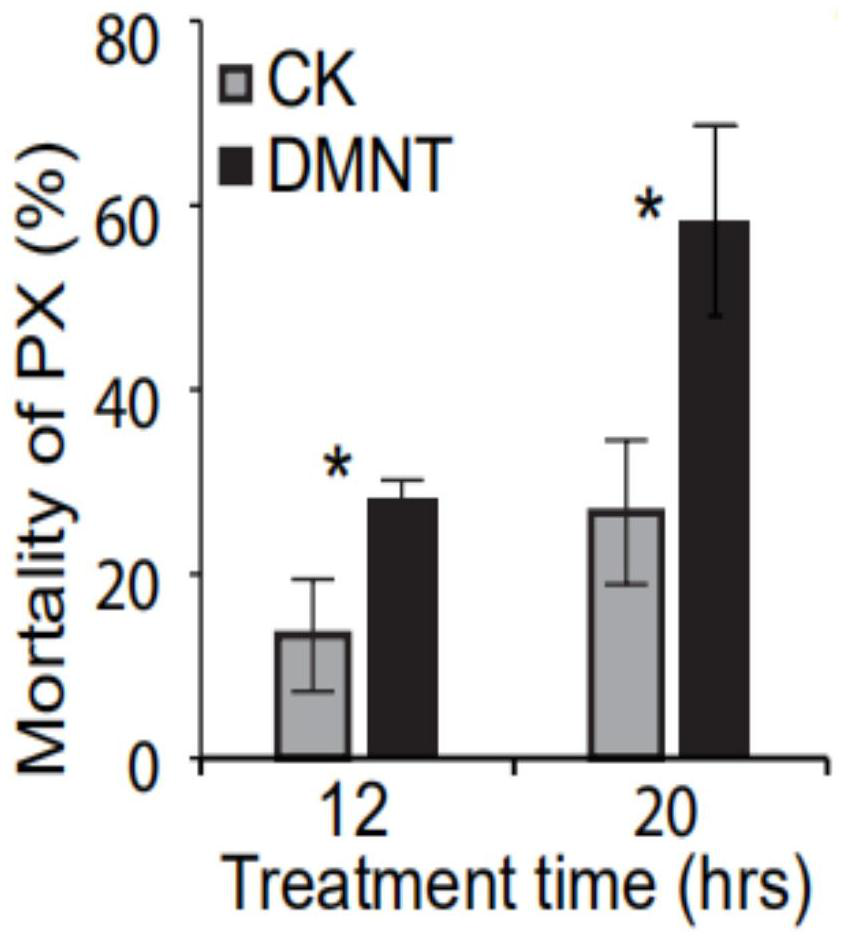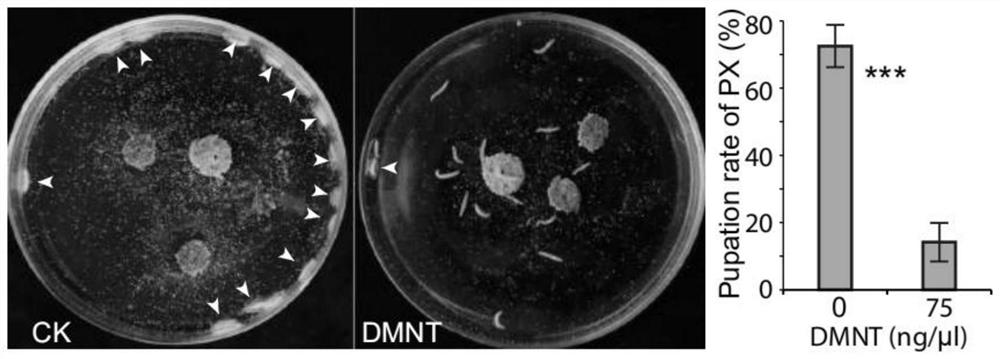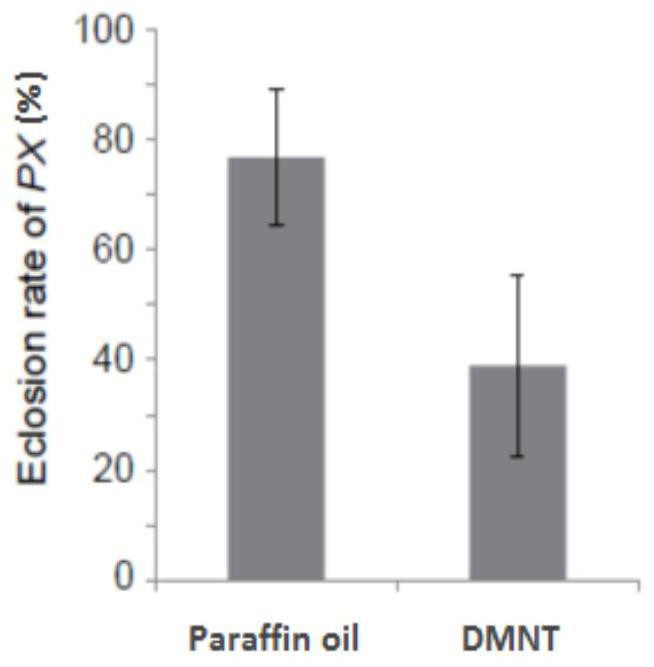Application of dmnt in preparation of lepidopteran insecticide
A technology for preparing pesticides and lepidoptera, applied in pesticides, applications, biocides, etc., can solve the problems of decreased corn kernel quality, decreased corn yield, broken rod diameter, etc. The effect of rate and feather rate
- Summary
- Abstract
- Description
- Claims
- Application Information
AI Technical Summary
Problems solved by technology
Method used
Image
Examples
Embodiment 1
[0025] Example 1: The toxic effect of DMNT on the cruciferous crop pest Plutella xylostella.
[0026] (1) Dissolve DMNT in paraffin and dilute to a sample concentration of 75ng / μl for use.
[0027] (2) The 4-day-old Plutella xylostella was starved for 1 hour.
[0028] (3) The experiment set up a control group and an experimental group, and each group set up 6 parallel repetitions. Use a puncher to drill feeds of uniform size, add three feeds to each plate, and add 5 μl of paraffin oil (control group) or 5 μl DMNT samples (experimental group) to each feed, that is, each feed in the experimental group contains 375ng of For DMNT, 15 diamondback moth larvae were put into each group and cultured in a constant temperature incubator at 25°C.
[0029] (4) The mortality rate of Plutella xylostella, and the pupation rate and eclosion rate of Plutella xylostella in the later stage were counted respectively at 12h and 20h after treatment.
[0030] The experimental results showed that t...
Embodiment 2
[0032] Example 2: The poisonous effect of DMNT on the corn pest corn borer.
[0033] (1) Dissolve DMNT in paraffin and dilute to a sample concentration of 1 μg / μl for use.
[0034] (2) The 3rd instar and 1 day old corn borer were starved for 1 hour.
[0035] (3) The experiment set up the control group and the experimental group, with 6 parallel repetitions respectively. Use a puncher to take feeds of uniform size, add three feeds to each plate, and add 15 μl of paraffin oil (control group) or 15 μl DMNT sample (experimental group) to each feed, that is, each feed in the experimental group contains 15 μg of DMNT , put 15 3rd instar 1 day corn borer larvae into each group. The treated corn borer larvae were cultured in a constant temperature incubator at 25°C.
[0036] (4) The mortality of corn borer and the molting rate of 3rd to 4th instar larvae were counted respectively at 48h and 72h after feeding.
[0037] The experimental results showed that with the increase of feedi...
Embodiment 3
[0039] Embodiment 3: DMNT is to the poisonous effect of fall armyworm
[0040] (1) Take fresh corn leaves, and apply 100 μl of paraffin (control group) and diluted 1 μg / μl DMNT (experimental group) on the leaves evenly, that is, each leaf of the experimental group contains 100 μg of DMNT.
[0041] (2) The 3rd instar Spodoptera frugiperda larvae were starved for 1 hour.
[0042] (3) Three Spodoptera frugiperda larvae were added to the control group (paraffin) and the experimental group (DMNT), respectively, and three biological replicates were set up.
[0043] (4) Put the treated Spodoptera frugiperda into a constant temperature incubator at 25°C.
[0044] The experimental results showed that the larvae in the control group did not die, and the larvae mortality in the experimental group exceeded 60% ( Figure 6 ). It shows that DMNT can effectively kill the larvae of fall armyworm.
PUM
 Login to View More
Login to View More Abstract
Description
Claims
Application Information
 Login to View More
Login to View More - Generate Ideas
- Intellectual Property
- Life Sciences
- Materials
- Tech Scout
- Unparalleled Data Quality
- Higher Quality Content
- 60% Fewer Hallucinations
Browse by: Latest US Patents, China's latest patents, Technical Efficacy Thesaurus, Application Domain, Technology Topic, Popular Technical Reports.
© 2025 PatSnap. All rights reserved.Legal|Privacy policy|Modern Slavery Act Transparency Statement|Sitemap|About US| Contact US: help@patsnap.com



